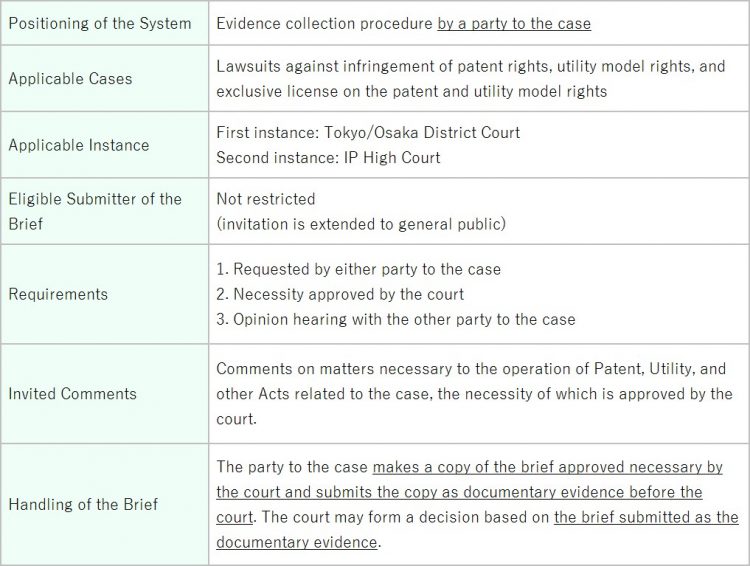2021.06.15 Patent
Introduction of System of Inviting Third-Party Comments in Infringement Suit of Patent (or other intellectual property) Rights
Introduction
As introduced in our Newsletter No. 3 delivered on March 22, 2021, the bill on revision of the Patent Act, the Utility Model Act, the Design Act, and the Trademark Act was approved by the Cabinet on March 2, 2021, passed and enacted on May 14, 2021, and promulgated on May 21, 2021.
This newsletter introduces details of “the system of inviting third-party comments in infringement suit of patent or other intellectual property rights” among the major revisions of the acts.
Background behind Introduction of System
The United States has a legal system that the court accepts amicus briefs, which are insight and information offered by someone who is not a party to a case. The United Kingdom also has a similar legal system.
According to Supreme Court Rule 37 in the United States, an amicus curiae may submit an amicus brief within the time allowed for submission if accompanied by the written consent of all parties to the case. An amicus brief may be submitted if the Court grants when a party to the case withheld consent.
The Federal Rules of Appellate Procedure 29 and Rules of the Court of Appeals for the Federal Circuit 29 in the United States also stipulate that an amicus curiae may submit an amicus brief if the brief states that all parties have consented to its filing or by leave of court.
Meanwhile, a conventional legal system in Japan was for the court to invite comments from limited individuals, such as technical experts, but not from the general public.
Within the framework of the law of the time, however, an invitation of comments from third parties was attempted in Apple Japan vs. Samsung Electronics case (Judgement of IP High Court rendered on May 16, 2014 (2013 (Ne) 10043) for the first time in the Japanese civil lawsuit in consideration of the large impact this court’s ruling might have. This invitation gathered a vast number of comments from inside and outside Japan, which demonstrated benefit in inviting comments from third parties for the court to deliver proper rulings based on a broad perspective.
Due to the recent development in AI and IoT technologies, lawsuits related to patent (or other intellectual property) rights are assumed to be more complicated and requiring high-level judgements. In such circumstances, there may be some future cases where an invitation for public comments works in favor of the court as seen in the Apple Japan vs. Samsung Electronics case. When such a case arises, the conventional law might have created a constraint on inviting public comments, such as that all parties to the case should consent to the submission of the brief. In view of these factors, the latest revision included the system of inviting third-party comments that allows the court to gather public comments when the court finds it necessary (Japanese version of amicus brief system).
Outline of System
As shown in the table far below, the system of inviting third-party comments is stipulated as a special provision in the evidence collection procedure by a party to the case. Thus, use of this system shall be requested by a party to the case. No restrictions are expected to be imposed on the content of comments a third party is allowed to submit. However, in accordance with the principle of party presentation*, the basic principle in Japanese civil procedures, the judge makes a ruling not based on the entire brief submitted by a third party but only a part of the brief submitted by the parties to the case before the court as documentary evidence. This feature in accordance with the principle of party presentation is a significant difference from the legal systems in the United States and other countries.
The system of inviting third-party comments has been introduced only to lawsuits against infringement of patent rights, utility model rights, and exclusive license on the patent and utility model rights. It is envisaged that the system is extended to other lawsuits as need arises.
* Principle of Party Presentation:
The principle of party presentation is the fundamentals where the rights and responsibilities in collecting and submitting materials in connection with the facts that form the basis for the court’s ruling should lie on the parties to the cases.
More specifically, the principle of party presentation can be defined as follows.
(1) The ruling should not be based on facts that are not asserted by the parties to the cases.
(2) With respect to the facts consented by both parties to the cases, the court must use such facts as the basis for the ruling without examining the truth or falsehood of the facts.
(3) Examination of evidence is only allowed with respect to the evidence requested by the parties to the cases (ex officio examination of evidence is forbidden).
System of Inviting Third-party Comments

Expected Practical Operation
After the enforcement of the system of inviting third-party comments, an assumed practical operation is that an attorney may give counsel to the third party on his/her comments and prepare a brief. In this respect, the Patent Attorneys Act was also amended so that the attorneys can give counsel on the content of the brief.
Conclusion
The system of inviting third-party comments is expected to improve accuracy in the courts’ rulings. We will continue to closely watch how the system is applied and practically used from here forward.
Edited by Hiroko Iwatsuki

